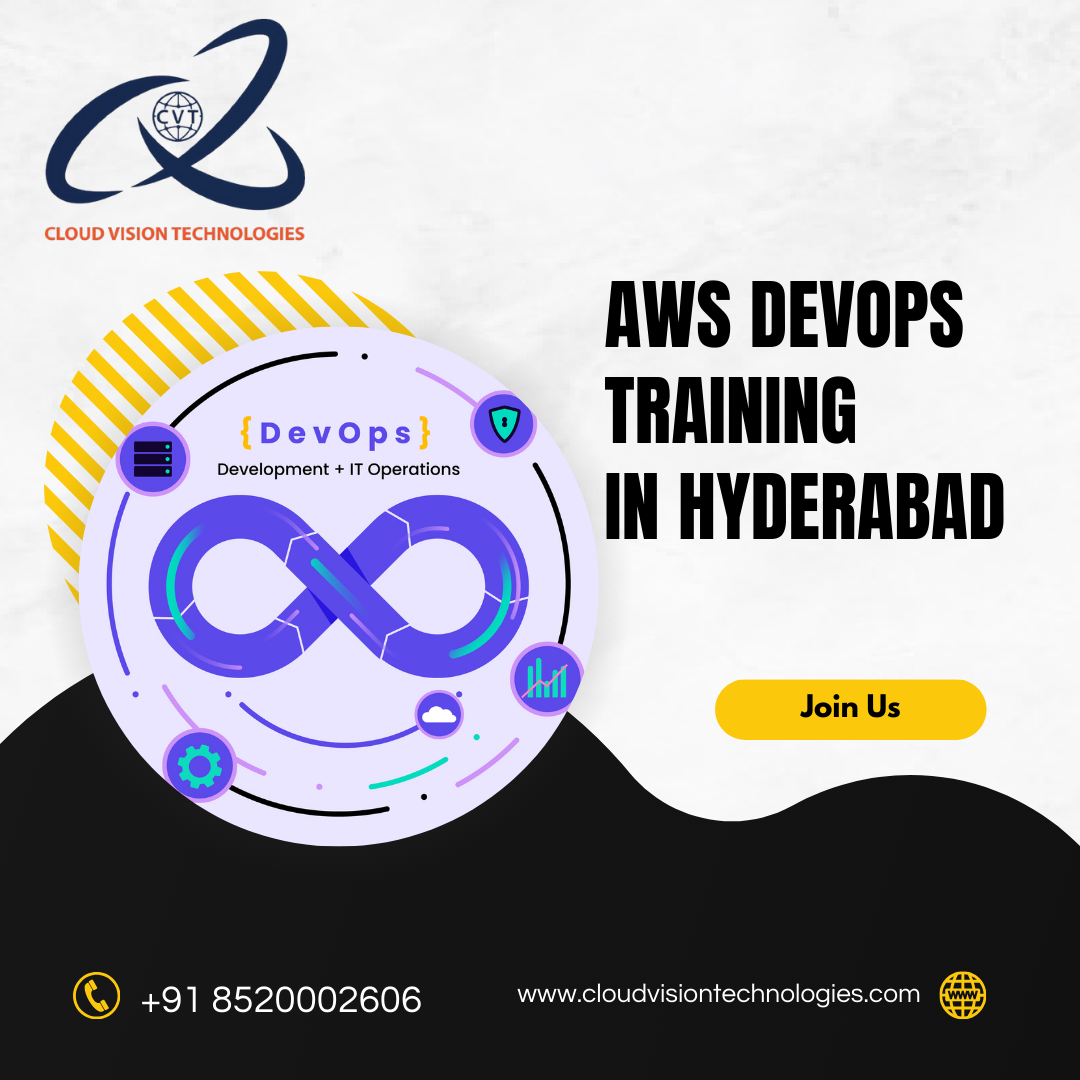
AWS DevOps Course
Introduction to AWS DevOps:
AWS DevOps Course, In today’s fast-paced software development environment, organizations are constantly looking for ways to enhance efficiency, speed up deployments, and improve reliability. AWS DevOps is a powerful combination of cloud computing and DevOps practices that enables businesses to achieve continuous integration, continuous delivery (CI/CD), automation, and infrastructure management. By integrating DevOps with AWS, organizations can develop, test, and deploy applications faster, with enhanced scalability and security. Cloud Vision Technologies.
What is AWS DevOps?
AWS DevOps is a set of practices, tools, and services provided by Amazon Web Services (AWS) that help businesses automate and streamline their software development lifecycle (SDLC). It combines DevOps principles with the flexibility, scalability, and security of AWS cloud services, allowing developers to build and deploy applications efficiently while maintaining high availability and security. AWS DevOps Course.
AWS DevOps is the practice of integrating AWS services with DevOps practices to automate and streamline the software development and deployment process. It involves using a variety of AWS tools and services to automate the CI/CD (Continuous Integration and Continuous Delivery) pipeline, infrastructure management, configuration, monitoring, and security, all while ensuring that the applications are scalable and resilient. The integration of AWS with DevOps practices ensures that teams can work collaboratively, deploy new features rapidly, and maintain high levels of reliability and performance.

Why Do We Choose AWS DevOps?
AWS DevOps is a preferred choice for organizations looking to enhance their software development, deployment, and infrastructure management. By combining AWS’s powerful cloud services with DevOps best practices, businesses can achieve faster releases, greater scalability, improved security, and cost efficiency. Below are the key reasons why AWS DevOps stands out: AWS DevOps Course.
Fully Managed DevOps Tools
AWS provides a comprehensive suite of fully managed DevOps tools such as AWS Code Pipeline, Code Build, Code Deploy, and Code Commit. These services automate CI/CD workflows, enabling seamless integration, faster deployments, and efficient version control. Unlike traditional DevOps setups, AWS eliminates the need for managing on-premises infrastructure, reducing operational overhead. AWS DevOps Course.
Scalable & Flexible Infrastructure
AWS offers on-demand scalability, allowing businesses to scale their infrastructure dynamically based on workload demands. Services like Auto Scaling, Elastic Load Balancing (ELB), and Amazon EC2 ensure that applications can handle varying traffic loads efficiently. Whether scaling applications up or down, AWS DevOps ensures optimal resource utilization without manual intervention. AWS DevOps Course.
Security & Compliance
AWS provides built-in security features to protect applications and infrastructure. AWS Identity and Access Management (IAM), AWS Shield (DDoS Protection), AWS Secrets Manager, and AWS Web Application Firewall (WAF) help enforce strict security policies and protect against cyber threats. Additionally, AWS complies with industry standards like ISO, HIPAA, SOC, and GDPR, making it a secure choice for enterprises.
Cost Optimization with Pay-as-You-Go Model
AWS DevOps follows a pay-as-you-go pricing model, meaning businesses only pay for the resources they use. AWS also provides cost-saving features like AWS Spot Instances, Reserved Instances, and AWS Compute Savings Plans, helping organizations reduce cloud expenses while maintaining high performance. With tools like AWS Cost Explorer, companies can analyze usage patterns and optimize their cloud spending effectively.
Automation & Infrastructure as Code (IaC)
AWS DevOps promotes automation and efficiency through Infrastructure as Code (IaC) using AWS CloudFormation and Terraform. These tools allow teams to define, provision, and manage infrastructure as reusable code, ensuring consistency, reducing manual errors, and improving deployment speed. AWS DevOps Course.
Serverless & Containerized Workloads
AWS DevOps supports serverless architectures with AWS Lambda and API Gateway, eliminating the need for server management. It also facilitates containerized deployments through Amazon ECS (Elastic Container Service) and Amazon EKS (Elastic Kubernetes Service), enabling businesses to build and scale microservices-based applications efficiently. AWS DevOps Course.
Reliable Monitoring & Logging
With AWS DevOps, businesses gain real-time insights into application performance and system health through Amazon CloudWatch, AWS X-Ray, and AWS Config. These monitoring tools track logs, set up automated alerts, and provide actionable insights, ensuring quick issue resolution and improved system reliability. AWS DevOps Course.
Seamless Integration with Third-Party Tools
AWS DevOps seamlessly integrates with popular third-party DevOps tools like GitHub, Jenkins, Docker, Ansible, and Kubernetes. This flexibility allows organizations to leverage their existing DevOps workflows while benefiting from AWS’s cloud capabilities. AWS DevOps Course.
Benefits of AWS DevOps
AWS DevOps provides numerous advantages that enable businesses to optimize their development and deployment processes. By integrating AWS services with DevOps methodologies, organizations can achieve faster, more secure, and highly scalable software deployment. Below are the key benefits of AWS DevOps: AWS DevOps Course.
Faster Deployment
One of the primary advantages of AWS DevOps is its ability to accelerate software deployment. By automating the software release cycle, AWS DevOps minimizes manual intervention, reducing human errors and ensuring consistency across deployments. With Continuous Integration (CI) and Continuous Deployment (CD) pipelines, developers can automate testing, building, and deployment processes, allowing updates to be released rapidly and efficiently. AWS DevOps Course.
This automation significantly reduces downtime and speeds up the time-to-market by handling repetitive tasks that would otherwise require manual effort. With tools like AWS Code Pipeline, AWS Code Build, and AWS Code Deploy, businesses can streamline their deployment workflows, ensuring smooth and frequent releases. AWS DevOps Course.
Scalability
Scalability is a crucial factor in modern application development, and AWS DevOps provides dynamic scaling capabilities to handle fluctuating workloads. Organizations can scale applications up or down based on demand, preventing over-provisioning of resources and reducing unnecessary costs. AWS DevOps Course. AWS provides a broad set of services specifically designed to support DevOps practices. Whether you’re managing infrastructure with AWS CloudFormation, automating testing and deployment with AWS Code Pipeline, or improving monitoring with Amazon CloudWatch, AWS DevOps tools can help you address every aspect of the DevOps lifecycle.

High Availability & Reliability
Ensuring application availability and reliability is a top priority for businesses, and AWS DevOps addresses this by leveraging AWS’s robust infrastructure. With Multi-AZ (Availability Zone) deployments, applications can run across multiple geographically distributed data centers, reducing the risk of downtime due to failures. AWS DevOps Course.
AWS Elastic Load Balancer (ELB) enhances fault tolerance by distributing incoming traffic across multiple instances, ensuring uninterrupted service. Additionally, AWS DevOps offers automated rollback capabilities, allowing organizations to restore previous versions of applications quickly in case of failures, thereby minimizing disruptions and ensuring business continuity. AWS DevOps Course.
Security and Compliance
Security is a fundamental concern in the DevOps lifecycle, and AWS DevOps incorporates robust security measures to protect applications and data. AWS Identity and Access Management (IAM) provides granular control over user permissions, ensuring that only authorized personnel have access to critical resources.
AWS Shield and AWS Web Application Firewall (WAF) offer advanced security protection against Distributed Denial of Service (DDoS) attacks and web-based threats, enhancing application security. Furthermore, AWS DevOps ensures compliance with industry standards such as ISO, HIPAA, SOC, and GDPR by integrating security frameworks and best practices into the development process. Businesses can confidently deploy applications while meeting regulatory requirements without compromising security. AWS DevOps Course.
Cost Optimization
AWS DevOps helps organizations optimize costs by adopting a pay-as-you-go pricing model, eliminating the need for upfront infrastructure investments. Businesses can manage cloud expenses efficiently with AWS Cost Explorer, which provides insights into resource usage and expenditure. Additionally, AWS Compute Savings Plans and AWS Spot Instances allow organizations to save costs by purchasing computing capacity at discounted rates. By tracking and analyzing resource utilization, companies can make informed decisions to prevent unnecessary expenses and allocate budgets effectively, ensuring maximum cost efficiency in their cloud operations. AWS DevOps Course.
Key AWS DevOps Tools & Services
AWS provides a comprehensive set of tools and services to facilitate the seamless implementation of DevOps practices. These services help automate software development, deployment, monitoring, and infrastructure management, enabling businesses to build and scale applications efficiently. Below are the key AWS DevOps tools and services:
AWS Code Pipeline
AWS Code Pipeline is a fully managed Continuous Integration and Continuous Delivery (CI/CD) service that automates the software release process. It enables teams to build, test, and deploy applications efficiently by orchestrating workflows with minimal manual intervention. With AWS Code Pipeline, developers can integrate various tools such as AWS Code Build, AWS Code Deploy, and third-party services like GitHub and Jenkins, ensuring smooth and consistent delivery of software updates. AWS DevOps Course.
AWS Code Build
AWS Code Build is a scalable build service that compiles source code, runs automated tests, and generates software packages ready for deployment. It eliminates the need for managing and provisioning build servers, as it automatically scales based on workload requirements. Code Build supports multiple programming languages and integrates seamlessly with CI/CD pipelines, helping developers automate the build process while ensuring quality and consistency. AWS DevOps Course.
AWS Code Deploy
AWS Code Deploy is a fully automated deployment service that simplifies application rollouts across various AWS services like Amazon EC2, AWS Lambda, and on-premises servers. It reduces deployment downtime and the risk of errors by ensuring a controlled and repeatable deployment process. With features like automated rollback and blue/green deployments, AWS Code Deploy enhances application reliability and availability.
AWS Code Commit
AWS Code Commit is a secure, fully managed Git-based source control service that enables development teams to collaborate efficiently. It supports version control, allowing developers to store and manage source code repositories securely. With AWS Code Commit, teams can integrate with other AWS DevOps tools, ensuring seamless collaboration and continuous delivery. The service also encrypts data at rest and in transit, enhancing security.
AWS CloudFormation
AWS CloudFormation is an Infrastructure-as-Code (IaC) tool that enables users to define and provision AWS infrastructure using templates. It automates resource deployment, ensuring consistency across environments while reducing manual configuration efforts. With CloudFormation, businesses can version-control infrastructure, replicate environments effortlessly, and scale applications without worrying about manual provisioning.
AWS Elastic Beanstalk
AWS Elastic Beanstalk is a Platform-as-a-Service (PaaS) solution that simplifies application deployment and management. Developers can deploy applications in various programming languages (such as Java, Python, .NET, Node.js, and PHP) without handling infrastructure complexities. Elastic Beanstalk automatically manages load balancing, scaling, and monitoring, allowing developers to focus solely on writing code rather than infrastructure management. AWS DevOps Course.
AWS OpsWorks
AWS OpsWorks is a configuration management service that automates application configurations and infrastructure management using Chef and Puppet. It helps teams define infrastructure as code, ensuring consistent configurations across different environments. With OpsWorks, businesses can efficiently manage application stacks, reduce deployment errors, and maintain a standardized environment across their AWS infrastructure.
Amazon CloudWatch
Amazon CloudWatch is a comprehensive monitoring and observability service that provides real-time insights into AWS applications and infrastructure. It collects and analyzes logs, performance metrics, and event data, helping teams detect anomalies, optimize application performance, and set up automated alerts. CloudWatch integrates with other AWS services to provide a centralized dashboard for monitoring and troubleshooting system performance. AWS DevOps Course.

AWS Lambda
AWS Lambda is a serverless computing service that allows users to run code in response to events without provisioning or managing servers. It enables developers to build event-driven applications by automatically executing code triggered by AWS services such as S3, DynamoDB, API Gateway, and CloudWatch Events. AWS Lambda scales automatically, ensuring cost efficiency by charging only for the compute time used.
Amazon EC2 & Auto Scaling
Amazon EC2 (Elastic Compute Cloud) provides scalable virtual servers for running applications in the cloud. With Auto Scaling, businesses can dynamically adjust the number of EC2 instances based on traffic demand, ensuring optimal performance and cost efficiency. Auto Scaling automatically adds or removes instances in response to load variations, preventing over-provisioning while maintaining application availability.
AWS DevOps Course
To maximize the benefits of AWS DevOps, organizations should adopt industry best practices that enhance automation, security, scalability, and cost efficiency. Below are key best practices to follow:This is where DevOps comes in—a set of practices that aim to shorten the software development lifecycle and provide continuous delivery with high software quality. When combined with Amazon Web Services (AWS), one of the leading cloud platforms, DevOps becomes even more powerful, enabling teams to build, test, and deploy applications quickly and efficiently in a scalable environment. AWS DevOps Course.
Implement CI/CD Pipelines
Continuous Integration and Continuous Deployment (CI/CD) are at the core of DevOps, ensuring that software is built, tested, and deployed efficiently. AWS CodePipeline automates CI/CD workflows, integrating with AWS CodeBuild, AWS CodeDeploy, and third-party tools like GitHub and Jenkins. By automating these processes, teams can deliver updates faster, reduce errors, and maintain software consistency across environments.
Infrastructure as Code (IaC)
Managing infrastructure manually is time-consuming and error-prone. Using Infrastructure as Code (IaC) tools like AWS CloudFormation or Terraform allows organizations to define and provision AWS resources using templates. This approach ensures consistency, improves deployment speed, and enables version-controlled infrastructure changes, reducing configuration drift and human errors. AWS DevOps Course.
Monitor and Log Everything
Effective monitoring and logging are crucial for maintaining application health and troubleshooting issues proactively. AWS provides robust monitoring tools like Amazon CloudWatch, AWS X-Ray, and AWS Config to track performance metrics, detect anomalies, and log system events. Organizations should configure alerts and dashboards to gain real-time visibility into application and infrastructure performance, enabling quick issue resolution.
Automate Security
Security should be integrated into every phase of the DevOps lifecycle. AWS IAM (Identity and Access Management) allows organizations to implement fine-grained access control, ensuring that only authorized users can access critical resources. AWS Secrets Manager helps manage sensitive data, such as API keys and database credentials, securely. By enforcing security best practices, including automated compliance checks and encryption, businesses can protect applications from cyber threats. AWS DevOps Course.
Adopt Containerization
Containerization simplifies application deployment, scaling, and management. AWS provides Amazon Elastic Container Service (ECS) and Amazon Elastic Kubernetes Service (EKS) for managing containerized workloads efficiently. By adopting containerization, organizations can achieve portability, improve resource utilization, and deploy microservices-based architectures that are highly scalable and resilient. AWS DevOps Course.
Use Serverless Architectures
To reduce operational overhead and improve scalability, organizations can adopt serverless computing with AWS Lambda and Amazon API Gateway. With AWS Lambda, developers can run event-driven applications without managing servers, paying only for actual execution time. API Gateway enables secure and scalable API management, making it easier to build serverless applications with minimal maintenance requirements.
Cost Optimization
AWS offers various pricing models to help organizations minimize cloud costs. Businesses should leverage Auto Scaling to automatically adjust resources based on demand, preventing over-provisioning. AWS Spot Instances and Reserved Instances allow cost savings by purchasing computing power at discounted rates. Tools like AWS Cost Explorer and AWS Trusted Advisor help track and optimize cloud spending, ensuring cost efficiency while maintaining performance. AWS DevOps Course.

Conclusion
AWS DevOps is a game-changer for businesses looking to automate and optimize their software development and deployment processes. By leveraging AWS tools, organizations can enhance agility, improve reliability, and scale their applications seamlessly. Whether you’re a startup or an enterprise, adopting AWS DevOps practices can significantly accelerate your DevOps journey. AWS DevOps Course.
AWS offers a diverse range of DevOps tools and services that streamline software development, deployment, monitoring, and infrastructure management. By leveraging these services, businesses can enhance automation, improve scalability, optimize costs, and increase application reliability. Whether implementing CI/CD pipelines, managing infrastructure as code, or monitoring application performance, AWS DevOps provides the flexibility and efficiency needed to deliver high-quality applications in a fast-paced digital landscape. AWS DevOps Course.
Address: Cloud Vision Technologies
Location: Samhitha Enclave, 3rd floor, KPHB Phase 9, Kukatpally, Hyderabad, Telangana – 500072
Contact Number : +91 8520002606
Mail ID: info@cloudvisiontechnologies.com
Website: https://www.cloudvisiontechnologies.com





